

I grew up in a family where, like clockwork, my father fetched the Minneapolis Star Tribune from the front stoop first thing in the morning. He then carried it to the kitchen table, where a little territoriality about various sections would ensue. Dad, and then the rest of us, would spend breakfast reading, expressing disgust or delight (most often the former) about something going on in the world. On week-end mornings especially, spirited conversations would take place about all manner of random topics: look at this brilliant cartoon! I can't believe Ann Landers said that! Why do the Vikings so rarely win? Will the Viet Nam war ever be over? Doesn't this "Mall of America" sound preposterous? Have you seen the review for the new play by Theatre de la Jeune Lune?
The Strib, which in better days was run by John Cowles Jr. (and founded by his grandfather) has recently filed for bankruptcy. John Cowles Jr. sat on the boards of directors of the The Associated Press and Columbia University's Pulitzer Prizes; he and his wife, Sage Cowles, have contributed immeasurably to the quality of life in the Twin Cities, elevating the level of dance, the arts, and discourse about philanthropy. They are Hill Fellows at the Hubert H. Humphrey Institute of Public Affairs. I'd love to know their views about the devolution of newspapers as purveyors of culture and information.
Daughter Number Three recently asked the question What Will You Miss About Newspapers?, echoing a post by marketing guy/"guru" Seth Godin (on January 14) called When Newspapers Are Gone, What Will You Miss? Godin's provocative-yet-blithe remarks (he won't miss much, and seems blasé about the demise of journalism) were picked up by Cory Doctorow over at Boing Boing, where they inspired a long, insightful comment thread.
Several writers talked about how newspapers helped them learn to read. Comment #2, posted by Robbo, reminds me a bit of my own experience:
When we were kids we'd all scramble over the various sections of the evening paper (The Telegram - now defunct) and hunker down on the floor of the living room to read. A lot of my early reading experience was gathered with the paper - starting with the comics - all emulating our father and poring over the wall of words spread out before us. Dinner would be ready and we'd all troop to the table - comparing black ink stained elbows as trophies of how much we had captured from those pages. Maybe when they come up with a touchscreen carpet that sensation of physical immersion in the media will return. That's what I would miss - the physical relationship with the paper - and the ink.
Other people noticed that Godin underestimates the effort and cost of quality news writing. This paragraph, with its focus on "magical economics," struck me (and others at Boing Boing) as just plain wrong:
The reality is that this sort of journalism is relatively cheap (compared to everything else the newspaper had to do in order to bring it to us.) Newspapers took two cents of journalism and wrapped in ninety-eight cents of overhead and distraction. The magic of the web, the reason you should care about this even if you don't care about the news, is that when the marginal cost of something is free and when the time to deliver it is zero, the economics become magical. It's like 6 divided by zero. Infinity.
Journalist Joshua Ellis took up the issue in a piece called "What Newspapers Are For" at his Work blog, Zen Archery:
But it’s not free. I can’t understand why people don’t see this. Writing an article about corruption in local or national politics is not free. It takes time and money to make it happen — more time and money than this blog post took, or Godin’s post took, enough time and money that most people can’t afford to do it simply for whuffie or blogerati status. Delivering it may be free and instantaneous, but that doesn’t mean making it is free and instantaneous. In this sense, the economics truly are magical, in the sense that most of the people attempting to practice them are making an extremely artful show out of smoke and mirrors. And the miracles are just as illusory.
This is a fascinating subject for those of us who are "content providers." It makes me want to sit in on a journalism class, to see how students and professors are sorting this out. How do they reimagine the career path that still makes way for quality news writing, going beyond the vagaries of attitude and opinion we click through in all of these blogs?
I tend to see this not as a case of either (newspapers) or (the Web), but both of these and other emerging and electronic communications, like video and tv. The carrier changes, but we still try to protect and enhance the quality of the news.
Andreas prefers to call it "the olds." Okay, off to bring in the Sunday New York Times, which I appreciate in both newsprint and on-line versions.












































































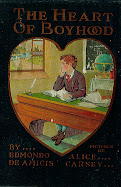


























































.jpg)














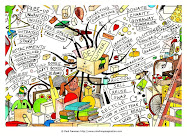












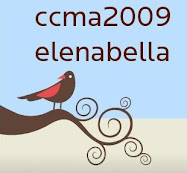













































































































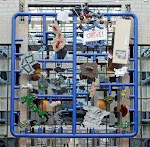.jpg)








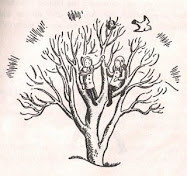
































































































3 comments:
We were just talking about this this morning over the Sunday paper, where we have an excellent independent small town paper, The Santa Fe New Mexican, that is suffering from a loss of ad revenue. Who is going to cover local and state issues and politics if we all end up reading online versions of The New York Times? It does take time and money to have people do investigative reporting on local issues that really do matter (say, political contributions to a sometimes-bearded governor).
We also were discussing how one thing that seems to be becoming antiquated is the letter to the editor. Increasingly, this is the province of baby boomers to do their complaining, and feel like they have done something by venting. OK, I've made a generational generalization, but it does seem that younger people in particular are not using letters to the ed as their tool for feedback. They blog and use online networks for opinionating, where there are open-ended mechanisms for dialogue.
Seth Godin's "magical" math, in which 6 divided by zero equals free journalism, reminds me of a Doonesbury strip from many years ago. The Doonesbury strip was purporting to show a T.V. news documentary about the life and career of William Simon, who was Secretary of Treasury during the Nixon and Ford administrations.
In the Doonesbury strip, a T.V. reporter interviews Simon's mother, who describs how as a young boy Simon once built a lemonade stand and sold lemonade: "He spent two dollars on the lemons and sugar and the materials for the stand. He sat out there all day and made 45 cents, and he came running into the house and said, 'Look, I made a net profit of 150 percent!"
Then, in the last panel of the strip, his mother says sweetly, "Oh, he was wrong, of course, but you should have seen how excited he was."
Incidentally, even putting aside the question of the "magical" element, Seth Godin's math, taken literally, is wrong: 6 divided by zero is not infinity. It's not possible to divide a number by zero: you can't divide something into zero parts. (Try dividing 6 -- or any other number -- by zero on a calculator, and you'll get an error message.)
What we need now is a bailout for newspapers. Not a blank check to soften the cushion for the likes of Sam Zell. No, let’s do it just like we’re doing it for the auto industry, and for the same reason. We must help newspaper journalism survive because it is vital to the Republic. But, only those newspaper companies that can develop a workable plan to quickly transport themselves into the digital age should be eligible for this bailout. And, the money should strictly go toward helping newspapers to stop killing trees and start being Internet only.
It's true that newspapers themselves are to blame for their predicament.Blind to the changes that everybody else saw and arrogant in thinking that they could survive on journalistic merit and an advertising base with nowhere else to go, they had their heads buried in the sand. But just like GM and Citi, they're too big to fail. So, let's spend a few million (not billion) to save them.
If newspapers start collapsing and closing down, we will lose a public service that’s more valuable than many branches of government. There will be almost nobody to keep government and industry honest without newspaper reporters. Blogs, TV & radio still get most of their news from newspaper reporters. Even the AP is supported by its newspaper membership. Without newspapers, AP doesn't survive.
Taxpayers should bail out newspapers. Newspapers have bailed out taxpayers often enough.
Read more at http://tinyurl.com/newspaperbailout
Post a Comment